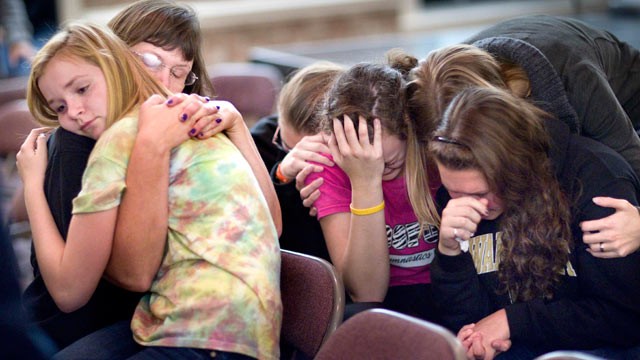
A parent and students console each other over the loss of their friends during a prayer meeting held at Pleasant Garden First Baptist Church, following a series of shootings by Mary Ann Holder, Pleasant Garden, N.C., Nov. 21, 2011.
Just days before Thanksgiving, tragedy was transformed to hope when two child victims of a murder-suicide in Pleasant Garden, N.C., saved a dozen lives by donating their organs.
Hannaleigh Michelle Suttles, 8, and Zachary Lee Smith, 14, have given others a second chance at life, according to the Guilford County Sheriff's Office. A third victim may soon be another organ donor.
Carolina Donor Services reported that Zach's organs saved seven lives, and Hanna's saved five.
The young organ donors were killed when Mary Ann Holder went on a shooting rampage Sunday, killing five, including both her sons and the niece she was raising. She then turned the gun on herself.
Her nephew Richard Suttles, 17, whom she was raising with Hanna, was still in critical condition with gunshot wounds to the head. "He's still hanging on," said Deputy Durand Dulin of the Guilford County Sheriff's Office.
A family spokesman Ariel Lackey told Fox 8 News that the boy would be taken off life support as soon as matching organ recipients were found.
ABCNews.com could not reach Lackey on Thanksgiving Day.
"Like the saying goes, out of tragedy comes something," said Dulin. "It's just so sad that so many lives had to be taken for someone else to survive. But it is a blessing."
Holder, 36, drove to three locations and shot six victims before turning the gun on herself. Police said she left two notes at her home, but would not reveal the contents.
"I worked the day of the shootings and it was hard to conceive that anything like that would happen," said Dulin. "There just aren't any words to thank the recipients. Everybody is really praying for the family, not just the victims but the survivors, too. They have to live with that -- and it's hard, especially on the kids."
Because not many children die and there is a lack of awareness about organ donation, more than 1,900 children under the age of 18 still sit on the national waiting list, according to ABC's Dr. Richard Besser.
More than 110,000 people are waiting for life-saving organ transplants nationally, according to the Carolina Donor Services. Of those, 3,400 are in North Carolina. More than 28,000 waiting for transplants were helped in 2010.
One person can save up to eight lives with their transplantable organs, which include the heart, lungs, liver, kidneys, pancreas, small intestines, and tissue donations, which can benefit up to 50 people.
One of the most high profile child organ donors was 9-year-old Christina-Taylor Green, the youngest victim when Congresswoman Gabrielle Giffords was shot last year.
Her organs saved the life of a little girl in Boston and brought sight to two other children in Arizona.
"It was a blessing when we heard about the children," her mother Roxanna Green told ABCNews.com in 2010. "It gives us some comfort that Christina would have wanted this ... She didn't think twice about this. We are so honored we could help these children."
Green said their family was committed to organ donation and urged others to consider that option after the tragic death of a child. "Take the time and think about this," she said.
"I knew we would need to talk about it as soon as we paid respects to Christina and prayed for her and she was up in heaven with God," said Green, a devout Catholic. "She wanted to help others. That's what she wanted to do in life."
"We grew up in this family that believes in helping others, and it's the right thing to do," she said. "In this tragedy I lost my daughter and it was horrible and she is never going to come back, so why not help someone else, to help them live a better life with their sight or organs? It's a fair thing to do."
"It's important to have this conversation," said Green. "It can bring meaning and comfort at a time of incredible loss."
Source: ABC